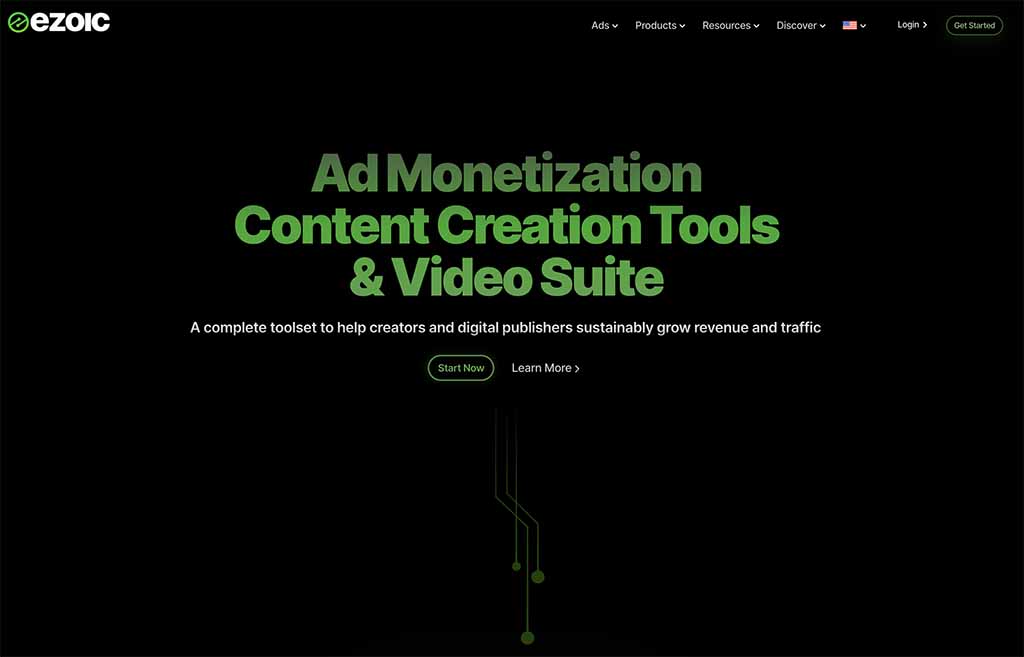Welcome to the exciting world of online entrepreneurship! If you’re here, it’s because you’ve likely taken the plunge into creating an affiliate website. This is a space brimming with potential, where compelling content meets curated products, all aligned with what your audience loves. But, there’s more to the story of digital success than just great content and affiliate links. That’s right, we’re talking about monetizing your affiliate website with display ads.
Think of display ads as the secret sauce that, when added to your website, enhances its flavour and brings in that passive income we all dream about. It’s like setting up a billboard in your digital backyard – one that pays you every time someone stops by for a visit. Intrigued? Well, you should be! Display advertising is a cornerstone of digital marketing, leveraging your site traffic to boost your earning potential.
But wait, before we dive deep into the realms of ad networks and strategic placements, let’s take a step back. How do we integrate these ads without turning our site into a neon jungle of clickbait? It’s all about striking that delicate balance between monetization and maintaining the trust you’ve built with your audience. Stick with me, and I’ll guide you through the ins and outs of monetising your affiliate website with display ads in a way that’s both effective and respectful to your visitors. Let’s get started!
Table of Contents
Setting the Stage: The Essentials of Monetizing With Display Ads

After our brief introduction, you might be wondering, ‘What exactly does monetizing your affiliate website with display ads entail, and why should I consider it?’
Great question!
At its core, this strategy is about making your website work smarter, not harder, for your wallet. It’s like turning your site into a multitasking genius that earns from every visitor, not just from those clicking on affiliate links.
Now, let’s paint a picture here. Imagine your website as a bustling marketplace. Each affiliate link is a shop, offering products your visitors might need.

Now, add display ads into this marketplace. These ads are like billboards and shop windows, catching the eye and offering something else of value. Your job is to place these billboards wisely, so they get noticed without overwhelming the scenery.
The beauty of monetizing your affiliate website with display ads lies in its simplicity and efficiency. With the right ads, placed thoughtfully, your site becomes not just a destination for quality content and products but also a space where relevant offers find their audience effortlessly. This doesn’t just increase your earning potential; it enhances the user experience by introducing them to products or services they might genuinely find useful.
But, and there’s always a but, diving into display advertising without a plan is like navigating a ship in uncharted waters. You need to know the basics, understand your audience, and have a clear strategy.
That’s what we’re going to cover next. How do you assess if your site is ready for ads? What kind of ads should you choose? Where should they go? All these questions and more, we’ll tackle together. So, let’s set sail towards a profitable horizon, shall we?
Related Post: Getting Traffic to Your Affiliate Marketing Website
Assessing Your Readiness for Display Ads

Before we jump into the deep end with display ads, let’s take a moment to dip our toes in the water. Not every affiliate website is ready for ads right off the bat, and that’s perfectly okay. It’s like preparing for a marathon; you need to ensure you’re in the right shape to cross the finish line successfully.
In the context of our discussion, this means making sure your website is primed and ready for the addition of display ads.
Understanding Your Audience and Traffic

First things first, let’s talk about your audience and traffic. Knowing who visits your website and why they’re there is crucial. If you’re attracting a steady flow of visitors looking for insightful content, product reviews, or recommendations, you’ve got a solid foundation.
But how many visitors are we talking about? If your site is still in its infancy with minimal traffic, it might be worth focusing on building your audience before introducing ads. Think of it this way: the more guests you have at your party, the more appetisers you should serve.
Evaluating Your Affiliate WebSite's Performance

Next up is your website’s performance. Slow loading times, confusing navigation, and frequent downtime can turn a visitor’s experience from delightful to dismal in seconds. Before adding display ads, which can further impact site speed and user experience, make sure your website is as sleek and efficient as a sports car, not a clunky old wagon. Tools like Google’s PageSpeed Insights can be a great help in this department.
Quality and Relevance of Your Content

Lastly, let’s not forget about the star of the show: your content. High-quality, engaging content is what keeps people coming back for more. It’s the glue that holds your site together and the magnet that attracts visitors in the first place. Before monetizing with display ads, ensure your content is top-notch and relevant to your audience’s interests. Ads should feel like a natural extension of your site, not a distracting billboard on the side of the road.
So, are you ready to dive into the world of display advertising? If you’ve nodded along to these checkpoints, then it’s time to move on to the next step: choosing the right display ad networks for your affiliate website.
Related Post: Innovative Strategies to Increase Your Affiliate Marketing Earnings
The Ultimate Affiliate Marketing Guide: Sign Up Now for Exclusive Tips and Strategies!
Choosing the Right Display Ad Networks

Now that you’ve got a handle on your website’s readiness for display ads, it’s time to talk about finding your perfect match in the world of ad networks. Not all networks are created equal, and the right choice can make a significant difference in your monetization success. It’s a bit like dating – you want to find a network that complements your site’s personality, values, and goals.
Let’s look at some of the key players in the game:
Google AdSense

Add Your Heading Text Here
Probably the most well-known of the bunch, Google AdSense is often the first stop for many publishers looking to monetize their site. It’s user-friendly, relatively easy to set up, and has a vast network of advertisers, which means a wide variety of ads can be displayed on your site. AdSense works on a cost-per-click (CPC) and cost-per-thousand-impressions (CPM) basis, giving you flexibility in how you earn.
However, Google AdSense has strict policies and standards, so your site needs to adhere to high-quality guidelines. It’s great for sites with high traffic volumes and a broad audience, as its algorithm efficiently matches ads to your site content and visitor interests.
| Feature | Details |
|---|---|
| Minimum Traffic | None |
| Ad Types | Text, images, rich media, video |
| Revenue Model | CPC (Cost Per Click), CPM (Cost Per Thousand Impressions) |
| Payment Threshold | $100 |
| Main Advantages | Wide range of advertisers, easy to use, reliable payouts |
| Best For | Websites with diverse or general content and high traffic volumes |
Media.net

Media.net stands out as the key player behind Yahoo and Bing’s ad network. It offers a significant advantage for sites focused on English-speaking traffic, specializing in contextual ads that are highly relevant to your site’s content. Like AdSense, Media.net operates on a CPC basis but is often praised for its high RPM (revenue per thousand impressions).
One of the perks of Media.net is its dedicated account managers who can help optimize your ad placements. However, it’s best suited for sites with a substantial amount of traffic from the US, Canada, and the UK.
| Feature | Details |
|---|---|
| Minimum Traffic | None specified, but quality of traffic is a factor |
| Ad Types | Contextual ads, display ads, native ads |
| Revenue Model | CPC (Cost Per Click) |
| Payment Threshold | $100 |
| Main Advantages | High RPM for English-speaking traffic, dedicated account managers |
| Best For | Websites with significant traffic from the US, UK, and Canada |
Ezoic

A somewhat different beast, Ezoic is not just an ad network but a machine-learning platform designed to optimize your website’s ad placements and formats for increased revenue and better user experience. Ezoic is compatible with your existing AdSense account, and it’s all about testing and learning what works best for your site.
Ezoic requires a minimum of 10,000 monthly visitors to get started, making it a good choice for sites that have begun to see a steady flow of traffic and are looking to seriously optimize their ad revenue.
| Feature | Details |
|---|---|
| Minimum Traffic | 10,000 monthly visits |
| Ad Types | Customizable based on site's performance and visitor experience |
| Revenue Model | CPM, CPC, and others through AI optimization |
| Payment Threshold | $20 via PayPal, $100 for checks |
| Main Advantages | AI-driven ad placement optimization, access to multiple networks |
| Best For | Websites looking to optimize ad revenue and user experience |
Choosing What's Right for You
While there are many more networks out there, starting with one of these can set you on the right path. The choice between them depends on your site’s traffic volume, audience demographics, and content niche. Remember, it’s not about who offers the highest payouts, but who offers the most consistent earnings for your specific site and audience.
As you get more comfortable with display advertising, don’t shy away from experimenting with different networks. Sometimes, the best strategy is a mix that captures the unique blend of your website’s visitors. And always keep an eye on the balance—your display ads should complement, not compromise, the user experience on your site.
Related Post: The Complete Guide To Understanding Affiliate Program Commission Structures
Maximizing Ad Placement for Increased Earnings

Choosing the right display ad network feels like a big step forward, doesn’t it? But there’s more to the journey. Now, we enter the realm of ad placement, a critical factor that can make or break your site’s earning potential. It’s not just about where your ads go; it’s about how they integrate with your content to create a seamless and enjoyable user experience. Here’s how to strike that perfect balance.
Understanding Site Layout and User Behaviour

First up, let’s talk layout. Your website is like a canvas, and ads are part of the overall picture. But not just any part—they need to be placed thoughtfully to catch the eye without disrupting the flow of your content. Consider how users interact with your site.
Which areas attract the most attention? Common hotspots include above the fold (the part of the web page visible without scrolling), at the end of articles, and near navigational elements. Placing ads in these areas can increase visibility and clicks without being too intrusive.
The Art of Being Non-Intrusive

Speaking of intrusion; less can indeed be more when it comes to ads. Overloading your site with ads can lead to ‘banner blindness,’ where users subconsciously ignore banner-like information. Worse, it can annoy and drive them away. The key? Balance. Your ads should feel like natural extensions of your website, offering value or interest to your visitors. This might mean fewer ads, but if they’re well-placed, they can be more effective and lead to a better user experience (and potentially higher earnings).
A/B Testing: Your Best Friend

Enter A/B testing, your scientific approach to maximizing ad efficiency. By testing different ad placements, types, and formats, you can discover what works best for your audience and your website’s unique layout. Maybe your users engage more with banner ads at the top of the page or perhaps native ads within the content. A/B testing lets you make data-driven decisions, ensuring you’re not just guessing but optimising based on real user behaviour.
Mobile Matters

In today’s world, optimizing for mobile is non-negotiable. A significant portion of web traffic comes from mobile devices, meaning your ads need to look good and function well on smaller screens. This might involve using responsive ads that adjust size based on the device or rethinking your ad placement strategy for mobile users. Remember, what works on a desktop might not translate directly to mobile, so consider your mobile audience’s needs and behaviours.
Related Post: Optimizing Your Website For Search Engines
A/B Testing: Finding Your Ad Sweet Spot

As we dive deeper into the science of ad placement, it’s clear that A/B testing isn’t just useful; it’s essential. By continually testing and refining your ad strategy, you can enhance both your earnings and your users’ site experience. It’s about finding that ‘sweet spot’ where ads are effective without being overwhelming. And remember, the digital landscape is always evolving, so what works today might need adjustment tomorrow. Stay agile, keep testing, and your website can become not just a place for great content but a thriving monetisation platform.
By now, you should have a solid understanding of the importance of choosing the right ad network and strategically placing your ads for maximum impact. But there’s one more piece of the puzzle: maintaining a people-first approach. In the next section, we’ll explore how to ensure your monetization efforts always align with the best interests of your audience.
Related Post: Importance of Building Relationships in Affiliate Marketing
Turn Your Passion into Profits
Maintaining a People-First Approach With Ads

In the world of website monetisation, it’s easy to get caught up in numbers and forget about the most critical component of your success: the people visiting your site. Your audience is the heartbeat of your affiliate website, and maintaining a people-first approach is paramount.
Here’s how to ensure your monetization strategies enhance rather than detract from the user experience.
Choose Ads That Align With Your Content

Your website is a unique reflection of your interests, expertise, and the value you provide to your audience. The ads you choose should complement this, offering products or services that are relevant and potentially beneficial to your readers. When ads resonate with your content, they feel less like interruptions and more like valuable additions to your site.
Be Transparent With Your Audience

Transparency builds trust, and trust is the foundation of any long-term relationship, including the one between you and your website visitors. Be clear about your use of display ads and affiliate links. Let your audience know that these monetisation methods help support the site, allowing you to continue providing valuable content free of charge. Most readers will appreciate your honesty and are more likely to engage with ads and affiliate products positively.
Optimize Ad Density

Finding the right balance in ad density is crucial. Too many ads can overwhelm your content, detracting from the user experience and potentially driving visitors away. On the other hand, too few ads might mean you’re missing out on revenue opportunities.
Aim for a balanced layout that includes ads in a way that feels natural and unobtrusive. Monitoring metrics like bounce rate and time on site can help you gauge how well you’re maintaining this balance.
Prioritise Loading Times and Site Performance

Ads, especially those with rich media or interactive elements, can slow down your site. In an age where speed is everything, even a few extra seconds of loading time can lead to frustration and lost visitors. Optimize your ads for quick loading, and regularly test your site’s performance to ensure it’s not being bogged down by the ads you’re displaying.
Keep Up With Regulations and Best Practices

The digital advertising world is constantly evolving, with new regulations and best practices emerging regularly. Staying informed about these changes ensures your advertising strategies are not only effective but also compliant with laws like GDPR in Europe and CCPA in California. Adhering to these regulations protects your audience’s privacy and maintains their trust in your site.
While striving to maintain a balance between monetization and user experience, staying informed about the latest digital advertising regulations and best practices is crucial. The Interactive Advertising Bureau (IAB) provides a wealth of resources that can help you navigate these complexities.
For an in-depth look at current guidelines and how they apply to your display ad strategies, I highly recommend visiting the IAB Digital Advertising Guidelines. This resource can ensure your monetization efforts are not only effective but also fully compliant with industry standards.
Related Post: Tips For Writing High-Converting Affiliate Product Reviews
Frequently Asked Questions About Monetizing Your Affiliate Website With Display Ads

As we’ve navigated through the essentials of integrating display ads into your affiliate marketing strategy, you might still have some questions. Here’s a quick dive into some of the most frequently asked questions to help clarify any lingering doubts and give you a headstart on your monetization journey.
Q1: How much traffic do I need before I start monetizing with display ads?
A1: There’s no one-size-fits-all answer, but a good rule of thumb is to start considering display ads once you consistently receive at least 10,000 visitors per month. This ensures that you have a sufficient audience to generate meaningful revenue from ads.
Q2: Will display ads slow down my website?
A2: Display ads can impact site speed, especially if they’re rich media or video ads. However, optimizing ad size and format, and using lazy loading can minimize this impact. Regularly testing your site’s speed and performance is crucial to maintaining a balance between monetization and user experience.
Q3: How do I choose the right ad placements on my website?
A3: The best ad placements often depend on your site’s layout and content. Generally, ads above the fold, at the end of articles, and alongside content in sidebars perform well. A/B testing is a valuable tool for finding the most effective placements for your specific site and audience.
Q4: Can I use multiple ad networks at once?
A4: Yes, you can use multiple ad networks to maximize your revenue potential. However, it’s essential to monitor the performance and user experience closely to ensure that the combination of networks isn’t adversely affecting your site.
Q5: How do I ensure my ads are relevant to my audience?
A5: Choosing ad networks that offer contextual or targeted advertising can help ensure that the ads displayed on your site are relevant to your audience. Additionally, regularly reviewing and adjusting your ad preferences and settings can help maintain ad relevance.
Q6: What’s the difference between CPC, CPM, and CPA advertising?
A6: These terms refer to different revenue models for display advertising:
- CPC (Cost Per Click): You earn money each time a user clicks on an ad displayed on your site. This model is beneficial for sites with an audience that is likely to be interested in the advertised products or services, leading to higher click-through rates (CTRs).
- CPM (Cost Per Thousand Impressions): With CPM, you earn based on the number of times an ad is displayed, regardless of clicks. It’s calculated per thousand impressions. This model can be advantageous for sites with high traffic but may not necessarily have high engagement with ads.
- CPA (Cost Per Action): This model pays you when users take a specific action, such as signing up for a trial or making a purchase, after clicking on an ad. CPA can yield higher earnings per action but typically has lower conversion rates than CPC.
Choosing the right model depends on your website’s traffic, audience behaviour, and the type of content you offer.
Q7: Are there any ad types that are more user-friendly but still effective for monetization?
A7: Yes, certain ad types are designed to be less intrusive and more engaging, thus improving user experience while still allowing for effective monetization. For example:
- Native ads: These ads match the look and feel of your site’s content, making them less disruptive. They’re effective because they blend in with your content, providing a smoother user experience.
- Interstitial ads: These full-screen ads appear at natural transition points, like between pages or after completing an action. While they’re more noticeable, using them sparingly can be a powerful engagement tool without being too intrusive.
- Responsive ads: These ads automatically adjust their size and format to fit different screen sizes and placements, ensuring a better user experience across devices.
Integrating these ad types thoughtfully can help maintain a positive user experience while maximizing your site’s earning potential.
Related Post: Steer Clear Of Failure: 5 Common Mistakes To Avoid In Affiliate Marketing
Conclusion: The Art of Monetising Your Affiliate Website With Display Ads

As we wrap up our journey through the intricacies of monetising your affiliate website with display ads, remember that the key to success lies in balance and constant optimization. From choosing the right ad networks to strategically placing ads and maintaining a people-first approach, each step is vital in creating a monetised website that serves your audience and supports your financial goals.
Monetising your site with display ads offers a fantastic opportunity to generate revenue while providing value to your audience. It’s a journey of learning, testing, and growing. Stay committed to providing excellent content, respect your audience’s experience, and remain adaptable to change. With these principles in mind, you’re well on your way to turning your affiliate website into a thriving, monetized platform that benefits both you and your readers.
Thank you for joining me on this exploration of display ad monetization. I’d love to hear about your experiences, successes, and challenges in the comments below. Let’s continue to learn from each other and navigate the ever-evolving landscape of digital marketing together.







Hi j like this in that it is focusing on the fundamentals of a successful online business. It’s harder then ever to compete out there but if you stick to the basics you can build a strong foundation for business. Was wondering if you could recommend the best affiliate networks for good banners and reputable companies to affiliate for?
Hey Jake,
Thank you so much for your thoughtful comment! You’re absolutely right—sticking to the fundamentals is more crucial than ever in today’s competitive online landscape. Building a strong foundation is indeed the first step towards success in any online business, and choosing the right affiliate networks is a significant part of that foundation.
When it comes to affiliate networks that offer a wide range of good banners and connect you with reputable companies, here are a few top recommendations:
ShareASale: Known for its vast directory of merchants, ShareASale is fantastic for finding reputable companies to affiliate with across various industries. Their interface is user-friendly, making it easier to find banners and promotional materials that align with your content.Commission Junction (CJ): CJ Affiliate is one of the largest and most established networks out there. They offer a wide selection of high-quality banners from well-known brands, making it easier for you to find partnerships that resonate with your audience.Rakuten Advertising: With a strong emphasis on quality and innovation, Rakuten offers access to reputable brands and a variety of creative assets, including high-quality banners, to enhance your affiliate marketing efforts.Amazon Associates: While not a traditional affiliate network, Amazon Associates allows you to link to any product on Amazon, offering a vast array of banners and promotional tools. The brand’s ubiquity and trustworthiness can significantly boost conversion rates.
Choosing the right affiliate network largely depends on your niche, audience, and the type of products or services you want to promote. It’s also worth exploring each network’s tools and support systems to ensure they meet your needs.
I hope this helps! If you have any more questions or need further assistance, feel free to ask. Best of luck with your online business endeavours, and here’s to building that strong foundation you mentioned.
Regards
John
Hey John,
Thank you for sharing these valuable insights on monetizing affiliate websites with display ads! The step-by-step instructions and pros and cons of display ads were incredibly helpful in understanding how to optimize my website for maximum revenue potential. I particularly appreciated the tips on ad placement and ad networks.
I have a couple of questions I’d love your insights on. Firstly, what’s your recommendation for finding the right balance between displaying ads and maintaining a clean, user-friendly website design? And secondly, have you found any specific ad networks or strategies that work best for affiliate websites in niche industries?
Keep up the good work!
Marios
Hi Marios,
Thank you so much for your kind words and engaging questions! I’m thrilled to hear you found the guide on monetizing affiliate websites with display ads helpful. Finding the right balance and strategies for your site is crucial for success, and I’m more than happy to share some insights on your queries.
Finding the Right Balance Between Ads and Design
Maintaining a clean, user-friendly design while displaying ads is indeed a delicate balance. Here are a few strategies I recommend:
Less is More: Instead of overwhelming your site with ads, focus on fewer, strategically placed ads. This approach not only keeps your site design clean but can also lead to better ad performance.Use Native Ads: Native ads blend in with your site’s content, making them less intrusive and more aligned with your design aesthetics.Prioritize User Experience: Ensure that ads don’t disrupt the navigation or load times of your site. Tools like Google PageSpeed Insights can be helpful to monitor your site’s performance.
Ad Networks and Strategies for Niche Industries
For affiliate websites in niche industries, selecting ad networks that offer targeted advertising solutions can be particularly beneficial. Here are a couple of suggestions:
Media.net: Known for its strong contextual ads, Media.net can be very effective for niche sites, as it helps display relevant ads based on your content.Ezoic: Utilizing artificial intelligence, Ezoic optimizes ad placements and types based on your audience’s behaviour, which can be especially useful for niche markets.
Additionally, exploring affiliate-specific networks like ShareASale or CJ Affiliate can provide access to a wider range of products and services tailored to your niche.
Every website and niche is unique, so it’s important to experiment and continuously refine your strategy based on what works best for your audience and content.
Thank you again for your engaging questions, Marios! If you have any more queries or need further advice, feel free to reach out. Wishing you all the best in optimizing your website for maximum revenue potential!
Keep exploring and optimizing,
John